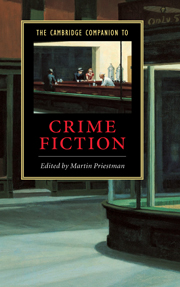Book contents
- Frontmatter
- Introduction
- 1 Eighteenth-century crime writing
- 2 The Newgate novel and sensation fiction, 1830-1868
- 3 The short story from Poe to Chesterton
- 4 French crime fiction
- 5 The golden age
- 6 The private eye
- 7 Spy fiction
- 8 The thriller
- 9 Post-war American police fiction
- 10 Post-war British crime fiction
- 11 Women detectives
- 12 Black crime fiction
- 13 Crime in film and on TV
- 14 Detection and literary fiction
- Guide to reading
- Index
- Series List
14 - Detection and literary fiction
Published online by Cambridge University Press: 28 May 2006
- Frontmatter
- Introduction
- 1 Eighteenth-century crime writing
- 2 The Newgate novel and sensation fiction, 1830-1868
- 3 The short story from Poe to Chesterton
- 4 French crime fiction
- 5 The golden age
- 6 The private eye
- 7 Spy fiction
- 8 The thriller
- 9 Post-war American police fiction
- 10 Post-war British crime fiction
- 11 Women detectives
- 12 Black crime fiction
- 13 Crime in film and on TV
- 14 Detection and literary fiction
- Guide to reading
- Index
- Series List
Summary
Detective fiction has played and continues to play a complex and curious role in relation to the broader field of literature. On the one hand, detective fiction, like other genre fictions, is seen as a popular and lesser subset of high or 'proper' literature. On the other, the literature of detection, with its complex double narrative in which an absent story, that of a crime, is gradually reconstructed in the second story (the investigation), its uses of suspense, and its power to give aesthetic shape to the most brute of matter, has been seen as paradigmatic of literary narrative itself. Tzvetan Todorov's 'The Typology of Detective Fiction', which remains one of the most significant contributions to the field, sought to uphold the distinction between 'genre fiction' and 'literature' (as a question of structure rather than of value). However, his identification of the two orders of story, inquest and crime, as equivalents to the Russian formalist distinction between sjuzet and fabula (often translated as 'discourse' and 'story' respectively), makes the detective story, as Peter Brooks writes, 'the narrative of narratives', its classical structure a laying-bare of the structure of all narrative in that it dramatises the role of sjuzet and fabula and the nature of their relation.
- Type
- Chapter
- Information
- The Cambridge Companion to Crime Fiction , pp. 245 - 268Publisher: Cambridge University PressPrint publication year: 2003
- 20
- Cited by



